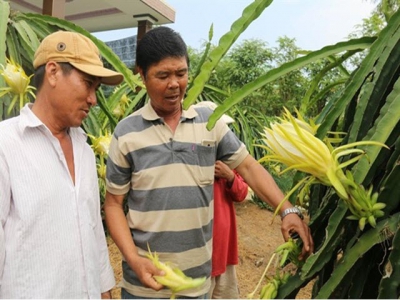In climate change-hit Tien Giang, rice farmers switch to fruits, vegetables

Tien Giang - More rice farmers in the Mekong Delta province of Tien Giang have switched to other crops as part of efforts to adapt to climate change.
At a dragon fruit orchard in Tien Giang province (Photo: VNA)
In Cai Lay and Cai Be districts in the upstream area of the Tien River, a tributary of the Mekong, they either switched completely or rotated rice with other crops in the ongoing 2019 -2020 dry season, according to the provincial Department of Agriculture and Rural Development.
Cai Be now uses more than 5,300ha of low-yield rice paddies to grow speciality fruits and rotates vegetables and rice on another 1,200ha.
Pham Van Thanh, head of the Cai Be Bureau of Agriculture and Rural Development, said farmers had grown many high-value vegetables like bitter gourd, cucumber and onion.
They have short growing periods and high yields, and require less water and offer higher profits than rice, according to Thanh.
Farmers who grow vegetables in the two districts earn three to five times more than from rice, according to the department.
Tran Ly Ngu Binh, head of the Cai Lay Bureau of Agriculture and Rural Development, said to enable rice farmers to switch to other crops, the district has upgraded irrigation canals and built new ones to ensure sufficient water.
Cai Lay has invested more than 29.6 billion VND (1.3 million USD) so far this year in 67 irrigation projects.
Cai Be has spent more than 56 billion VND (2.4 million USD) to build 167 irrigation projects, dredge canals and upgrade sluices to keep out saltwater.
Drought and saltwater intrusion have affected nearly 60,000ha of crops in the 2019 -2020 dry season in the province’s western region, which includes the two districts and Cai Lay town.
They include more than 23,000ha of rice and 36,000ha of speciality fruits.
Besides improving irrigation facilities, the localities have also installed water salinity testing devices along rivers.
The Cai Be District People’s Committee has installed 25 of them in communes along the Tien River to measure salinity on a daily basis.
Communes and farmers have hundreds more of the devices.
In Cai Lay, in areas that lack saltwater prevention dykes, authorities have told farmers how to store water and keep out saltwater in the Ham Luong River, one of the province’s largest.
Authorities regularly provide information about saltwater intrusion and the schedule for opening and closing sluices to farmers so that they know when to draw water from rivers and canals for irrigation.
The province has transported water from other places to save speciality fruit crops, which are facing a severe shortage of water due to drought and saltwater intrusion.
Around 2,275ha of fruit orchards have been affected by the water shortage, with 2,186ha being damaged by 30 – 70 percent and the rest by more than 70 percent.
Tien Giang, the country’s largest fruit producer, has more than 77,700ha under fruits, which include specialty fruits like Lo Ren milk apple, Hoa Loc mango, Ngu Hiep durian, and Cho Gao dragon fruit.
The province grows more than 1.5 million tonnes annually.
Related news
 Trà Vinh farmers expand organic rice areas
Trà Vinh farmers expand organic rice areas The Cửu Long (Mekong) Delta province of Trà Vinh has encouraged farmers to expand environmentally friendly organic rice fields that have improved the quality
 Bac Giang to host lychee trade promotion teleconference next month
Bac Giang to host lychee trade promotion teleconference next month The northern province of Bac Giang will host a teleconference on June 6 to promote the domestic consumption and export of lychee, a local specialty
 Agribusinesses rocked by twin negative impacts
Agribusinesses rocked by twin negative impacts In spite of several highlights, the agricultural picture remains gloomy due to twin blows of climate change and coronavirus.